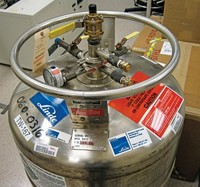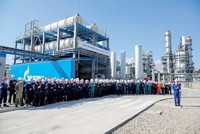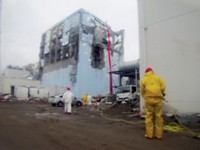Advertisement
Grab your lab coat. Let's get started
Welcome!
Welcome!
Create an account below to get 6 C&EN articles per month, receive newsletters and more - all free.
It seems this is your first time logging in online. Please enter the following information to continue.
As an ACS member you automatically get access to this site. All we need is few more details to create your reading experience.
Not you? Sign in with a different account.
Not you? Sign in with a different account.
ERROR 1
ERROR 1
ERROR 2
ERROR 2
ERROR 2
ERROR 2
ERROR 2
Password and Confirm password must match.
If you have an ACS member number, please enter it here so we can link this account to your membership. (optional)
ERROR 2
ACS values your privacy. By submitting your information, you are gaining access to C&EN and subscribing to our weekly newsletter. We use the information you provide to make your reading experience better, and we will never sell your data to third party members.
Safety
Medical Isotope Shortage
Shutdowns of nuclear reactors in Europe are behind the crisis
by Patricia Short
September 15, 2008
| A version of this story appeared in
Volume 86, Issue 37
A shortage of medical isotopes has developed in Europe, according to the European Association of Nuclear Medicine. The association says that nuclear medical clinics can no longer carry out a large part of their diagnostic and therapeutic activities and that many patients face danger to their health.
The isotopes—primarily molybdenum-99, from which technetium-99m is generated—are used in more than 80% of routine nuclear-imaging tests for procedures such as cardiac blood-flow imaging, bone scanning for secondary tumors, and renal function monitoring.
The shortage stems from temporary shutdowns of the major nuclear reactors that make the isotopes. They are down for several reasons, including routine maintenance, repairs following a lightning strike, and the correction of operating errors, pointed out Andrew Hilson, a nuclear medicine specialist at the Royal Free Hospital, in London, in a recent BBC Radio interview.
The situation became serious after the late-August idling of a reactor in Petten, the Netherlands, which normally supplies about 25% of world demand. At the time, its operator, NRG, said it observed gas bubbles escaping from the pipe leading into a key cooling system. As a result, NRG won't run its normal October irradiation cycle.
This is not the first time the medical world has faced tight isotope supplies. Last December, NRG upped production to nearly 40% of global demand after a reactor in Chalk River, Ontario, was closed because of problems encountered during routine maintenance.
Hilson was one of a trio of nuclear medicine specialists to write to British medical journal BMJ recently to warn about looming shortages (2008, 337, a1577). Their letter said that most commercial reactors are 40 years old and that new capacity is urgently needed.








Join the conversation
Contact the reporter
Submit a Letter to the Editor for publication
Engage with us on Twitter